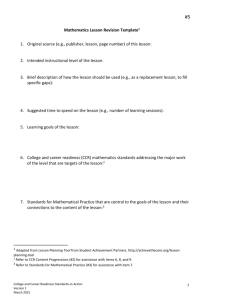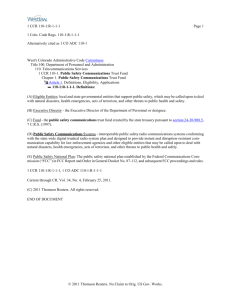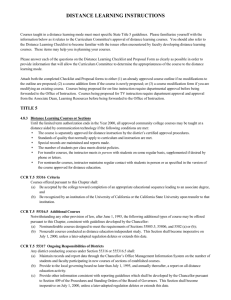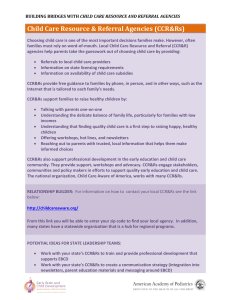Calculating “Cost”: Cost-to-Charge Ratios
advertisement
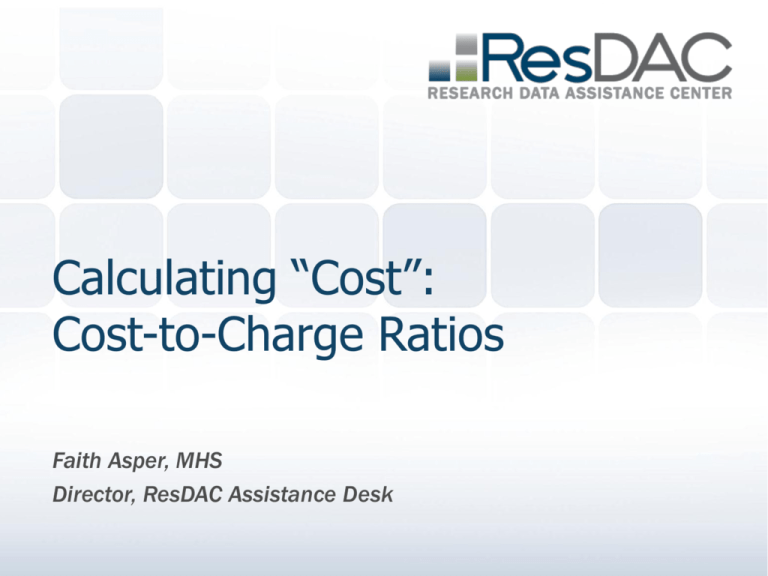
Calculating “Cost”: Cost-to-Charge Ratios Faith Asper, MHS Director, ResDAC Assistance Desk Objectives Define cost-to-charge ratios (CCRs) Examine uses and types of CCRs Provide CCR formulas Identify cost and charge variable locations within the cost reports Review an example from the literature Outline steps needed to calculate and apply CCRs to charges 2 Cost-to-Charge Definitions A ratio of the cost divided by the charges. Generally used with acute inpatient or outpatient hospital services. The following CCRs can be calculated from the Hospital cost reports ˗ Total Hospital (all payers, all patients) » Hospital level » Cost center specific ˗ Medicare specific » Hospital level » Cost center specific 3 Costs Defined for Other Facilities Skilled Nursing Facilities (SNFs) ˗ CCRs for ancillary and outpatient services only ˗ Use cost per diem instead HHAs report cost per visit Hospices report cost per day Renal Dialysis facilities report cost per treatment RHC report cost per visit 4 Use of CCRs Medicare uses CCRs for ˗ Calculation of outlier payments ˗ DRG cost weighting Researchers use CCRs as a method to convert charges to cost 5 Types of CCRs Available Cost center level CCRs ˗ Found in downloadable cost report data Hospital overall total CCR ˗ Found in downloadable cost report data ˗ Found in “CSTS_CHRGS…” report found in “…REPORTS…” Download Medicare specific CCR ˗ Found in downloadable cost report data ˗ Found in annual “Impact File” under Medicare Inpatient PPS website. » Medicare Capital CCR » Operating CCR 6 Cost-to-Charge Formulas All Payer Total or Cost Center CCRs CCR = Cost / Charges Worksheet C, Parts I, Columns 5 (Cost), 6, & 7 (Charges) ˗ Hospital overall CCR ˗ Cost center specific CCR Total all hospital cost and charge report available from CMS Hospital cost report website under “Reports” download. ˗ CCR = Cost (Column 5)/Charges (Column 6 + Column 7) 7 Cost-to-Charge Formulas Medicare Specific CCR Detailed formula found in the Internet Only Manuals 100-04 Claims Processing, Chapter 3, Section 20.1.2.1 – Cost to Charge Ratios, Section A – Calculating a Cost-to-Charge Ratio Worksheet D is used Medicare calculates Operating and Capital CCRs Can also find Medicare Hospital-specific CCRs in annual Impact Files ˗ http://www.cms.gov/Medicare/Medicare-Fee-for-ServicePayment/AcuteInpatientPPS/Historical-Impact-Files-for-FY1994-through-Present.html ˗ Medicare Hospital-specific CCR = Capital CCR + Operating CCR 8 Review Example from Literature Reference Article Chen et al. Chen, LM “Hospital Cost of Care, Quality of Care, and Readmission Rates…” ˗ (Free access) http://archinte.jamanetwork.com/article.aspx?articleid=77 4388 Read p. 341, “Data” and “Hospital Cost Model” sections 1. What was the name of the file that they used to calculate the cost-to-charge ratios? 2. In paragraph 2 of the “Hospital Cost Model” section, which variables identified could possibly be found in the cost report data? 9 Review Example from Literature Reference Article Chen et al. Review what is in the Impact File: http://www.cms.gov/Medicare/Medicare-Fee-forService-Payment/AcuteInpatientPPS/HistoricalImpact-Files-for-FY-1994-through-Present.html 10 Review Example from Literature Reference Article Chen et al. Impact File was used to adjust charges ˗ Medicare operating cost-to-charge ratio ˗ Medicare capital cost-to-charge ratio ˗ Medicare Hospital cost-to-charge ratio = operating + capital CCR ˗ Range: CCR .12 to .96 11 Review Example from Literature Reference Article Chen et al. What is the difference between the Hospital Medicare CCR and the Total CCR? Examples: ˗ Provider 01-0005 » Total CCR = .21 » Medicare CCR = .36 ˗ Provider 01-0006 » Total CCR = .33 » Medicare CCR = .23 12 Review Example from Literature Reference Article Chen et al. Observations: The data aren’t very timely ˗ Impact file uses cost reports that are 2-3 years old ˗ Cost to charge reports may take 2 years to obtain complete information Relatively easy to apply 13 Steps to Apply CCRs to Charges 1. 2. 3. 4. 5. Clean up cost reports Calculate Hospital specific CCR Check for missing or extreme values Create a revenue center to cost center crosswalk Multiply CCR times charges to obtain cost 14 Step 1: Clean up Cost Reports Identify hospitals with multiple cost reports ˗ Try to find a 12-month cost report ˗ Evaluate partial year cost reports to determine if you should combine cost reports Examine data for duplicate cost reports and determine which one to use ˗ Duplicates are errors ˗ This happens very, very seldom 15 Step 2: Calculate Cost-to-Charge Ratios Determine which CCR you wish to calculate ˗ Total all payer Hospital-specific CCR ˗ Total cost center level hospital-specific CCR ˗ Medicare CCR Use the formulas provided in previous slides to calculate the CCR 16 Step 2: Calculate Cost-to-Charge Ratios Worksheet C, Part I (2010 forms) See README document for special unit coding for 1996 forms. 17 Step 2: Calculate Cost-to-Charge Ratios Example of cost center coding Resource document HOSP2010_CSTCODES.pdf Line Number 18 Step 2: Calculate Cost-to-Charge Ratios Example for Adult & Pediatrics Cost Center 03000 FY 2011 (2010 forms) Hospital Provider Number CCR 01-0001 0.61 01-0005 1.36 01-0006 0.59 01-0007 1.39 01-0008 0.70 01-0009 1.23 01-0010 1.04 01-0011 0.52 01-0012 0.74 19 Step 3: Check for Missing or Extreme Values Evaluate missing CCRs ˗ Use previous year CCRs ˗ Use hospital overall total CCR ˗ Eliminate provider from analysis Evaluate extreme values ˗ CMS usually trims CCRs that are 3 SD from the geometric mean ˗ CMS replaces extreme values with the Statewide average CCR or previous year CCR 20 Step 3: Check for Missing or Extreme Values Example for Adult & Pediatrics Cost Center 03000 FY 2011 (2010 forms) Adult & Peds 03000 Operating Room 05000 Anesthesia 05300 Zero CCR 18.1% 28.0% (12.3% didn’t report any cost or charges) 55.6% (43.5% didn’t report any cost or chgs) <10 79.7% 71.2% 44.2% >=10 1.86% 0.8% 0.2% 21 Step 4: Create Revenue Center to Cost Center Crosswalk Researcher needs to develop a crosswalk, no standard crosswalk available Utilization files contain revenue centers Cost reports contain cost centers Revenue center DO NOT EQUAL Cost centers 22 Revenue Centers to Cost Center Crosswalk Definitions Source: Essentials of Cost Accounting for Health Care Organizations, Finkler 1994 Usually, a health care organization is divided into areas or units of responsibility These units of responsibility are referred to as revenue centers or cost centers “Department” is often used to describe either a cost center or a revenue center. Managers of a revenue center are responsible for both revenues and expenses of that unit – Intensive Care Unit Managers of a cost center are responsible for only the expenses of the unit – Finance department 23 Revenue Centers in Utilization Files versus Cost Center in Cost Reports Inpatient Claims Revenue Center MedPAR file Revenue Center Groups Hospital Cost Reports Cost Center 0141 Private room, medical/surgical Private room charge amount (Rev ctrs 011X, 014X) 03000 Adult and pediatrics (general routine care) 0258 Pharmacy, IV solution Pharmacy charge amount 07300 Drugs charged to (025X, 026X, and 063X) patients 24 Example Revenue Centers to Cost Center Crosswalk Revenue Center Revenue Center Description Cost Center Cost Center Description 0100 All inclusive rate-room and board plus ancillary 03000 Adult and pediatrics (general routine care) 0101 All inclusive rate-room and board 03000 Adult and pediatrics (general routine care) 0110 Private medical or generalgeneral classification 03000 Adult and pediatrics (general routine care) 0111 Private medical or generalmedical/surgical/GYN 03000 Adult and pediatrics (general routine care) 0112 Private medical or generalOB 03000 Adult and pediatrics (general routine care) 0113 Private medical or generalpediatric 03000 Adult and pediatrics (general routine care) 25 Step 5: Multiply CCR times Charges to Obtain Cost When using overall hospital CCR, link on hospital provider number and multiply charges by CCR If calculating cost at cost center level, link on hospital and cost center then multiply charge by cost center CCR ˗ Apply the provider specific CCRs to the revenue center total charges 26 Step 5: Multiply CCR times Charges to Obtain Cost MedPAR ˗ Revenue Center Group Cost = [Revenue center group name] Charge Amount * Cost center group cost-tocharge ratio Inpatient claims ˗ Revenue Center Cost = Revenue center total charge amount * cost center cost-to-charge ratio 27 Example from MedPAR File Knee replacement cohort from 2002 MedPAR Provider Number Case Rev Ctr Group XX0001 A Anesthesia XX0001 A XX0001 Rev Ctr Grp Chg Amt CCR Estimated Cost $1,883 .150 $282 Blood Administration $844 .000 $0 A Cardiology $109 .434 $47 XX0001 B Anesthesia $1,088 .150 $163 XX0001 B Blood Administration $1,853 .000 $0 XX0001 B Cardiology $109 .434 $47 28 Comparison Between MedPAR & Inpatient Knee cohort from 2002, same population pulled from MedPAR and Inpatient files. MedPAR Estimated Cost = $17,208 Inpatient Estimate Cost = $14,487 29 Summary Considerable amount of efforts is required to use CCRs at cost center level Need to evaluate the potential benefit of using this method and the time required Determine which CCR you need to use ˗ Cost center specific, ˗ Overall hospital specific, ˗ Medicare specific 30

